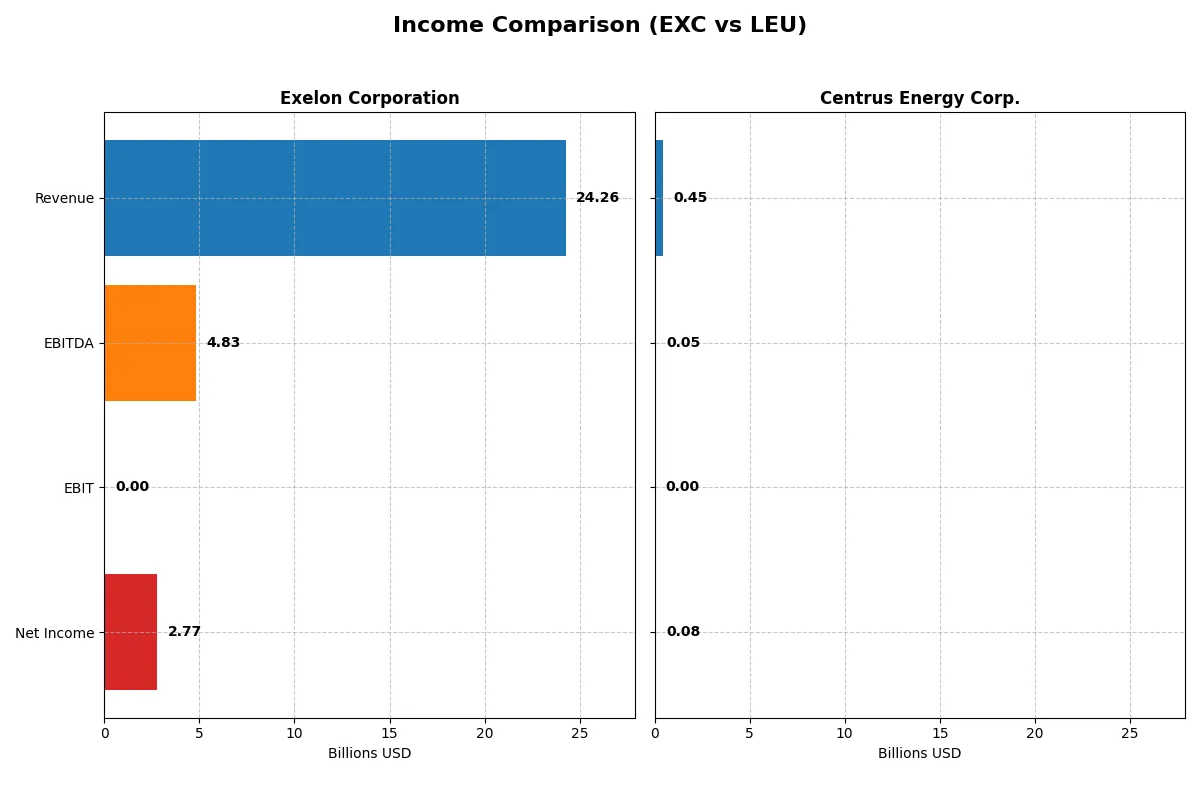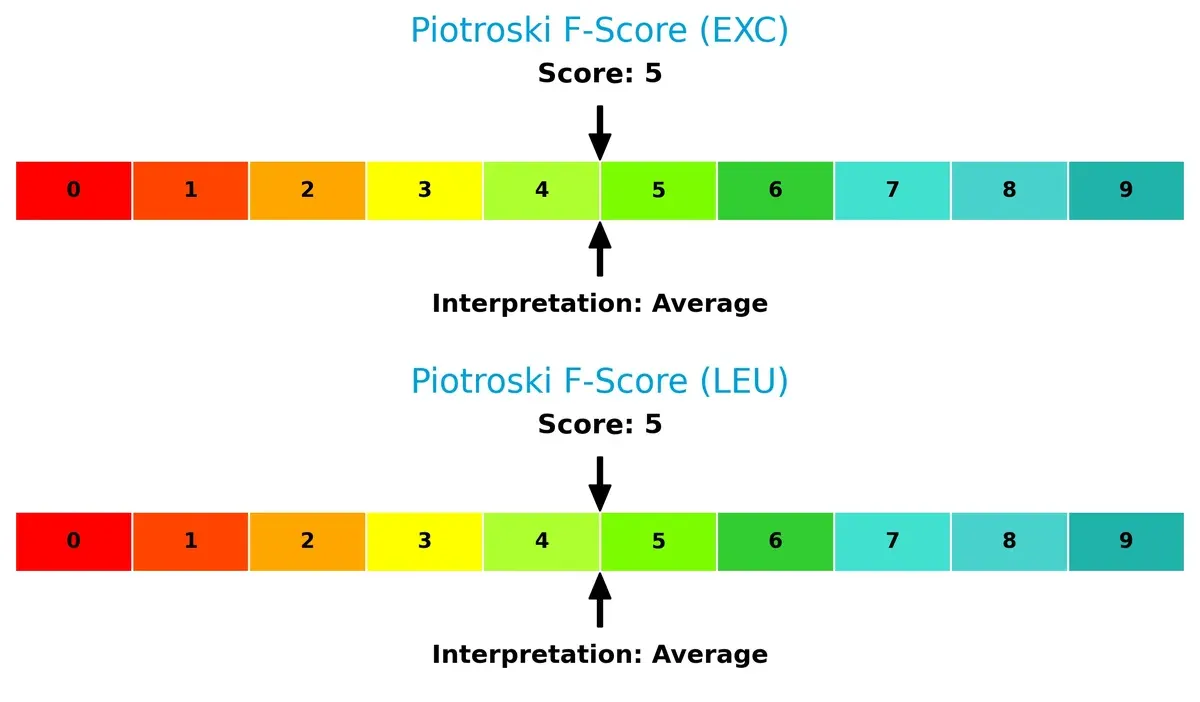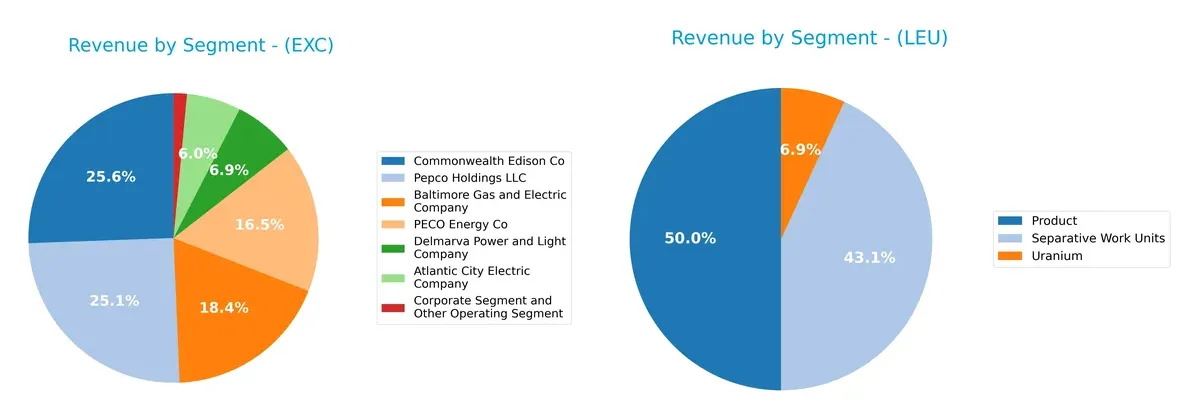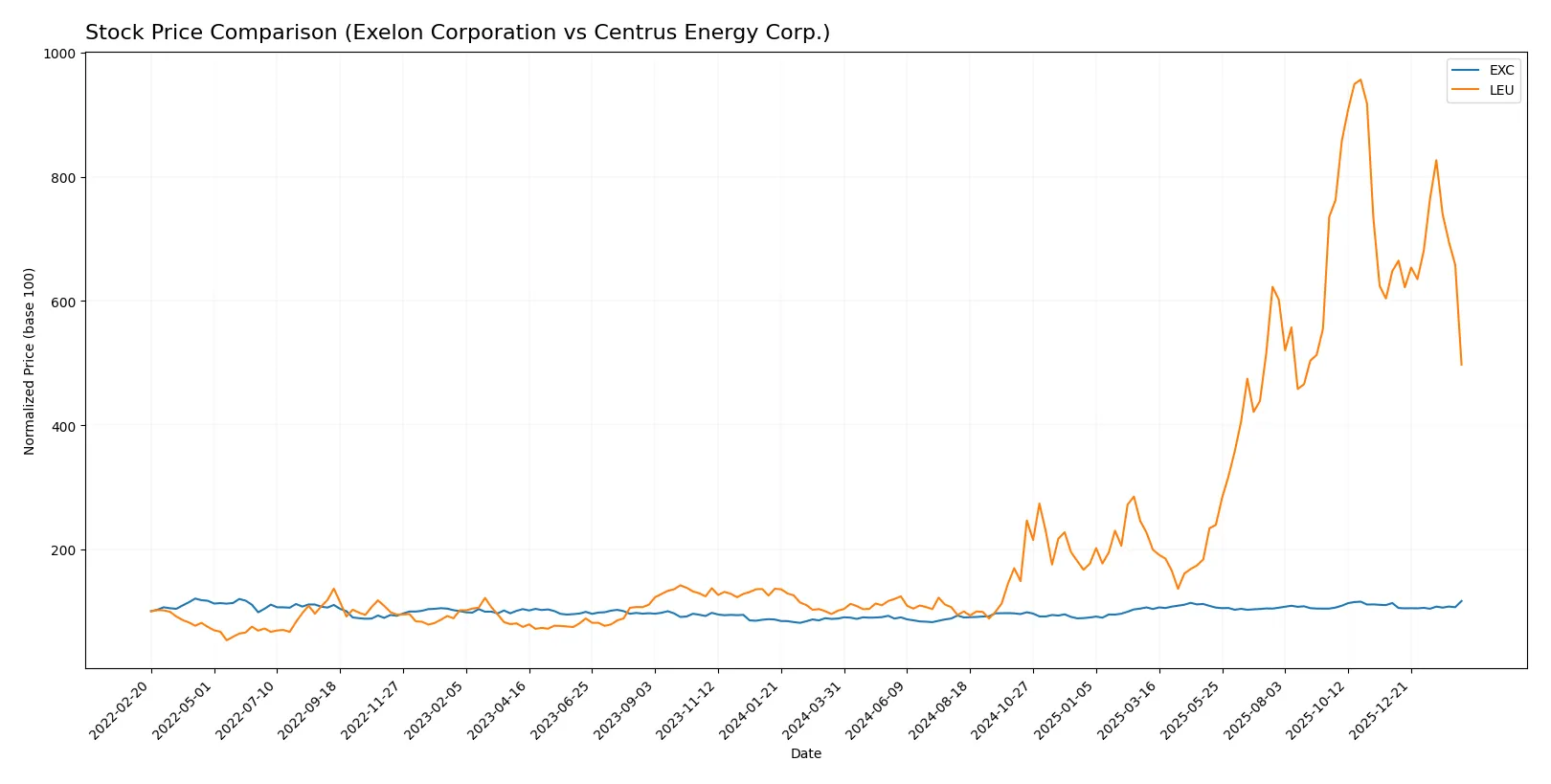Home > Comparison > Utilities > EXC vs LEU
The strategic rivalry between Exelon Corporation and Centrus Energy Corp. shapes the evolving landscape of the energy sector. Exelon, a diversified utility giant, operates regulated electric generation and distribution across multiple energy sources. In contrast, Centrus specializes in uranium supply and nuclear fuel services, a niche yet critical segment. This analysis evaluates which company’s business model and capital allocation offer superior risk-adjusted returns for a diversified portfolio in today’s complex energy environment.

Table of contents
Companies Overview
Exelon Corporation and Centrus Energy Corp. shape critical segments of the US energy landscape with distinct business models.
Exelon Corporation: Integrated Utility Powerhouse
Exelon dominates the regulated electric sector with a diversified generation portfolio including nuclear, fossil, wind, and solar. It drives revenue through electricity sales to wholesale and retail customers across the US and Canada. In 2026, Exelon focuses on expanding renewable energy capacity and enhancing grid reliability to meet evolving regulatory demands.
Centrus Energy Corp.: Nuclear Fuel Specialist
Centrus Energy leads in supplying nuclear fuel and technical services for power plants domestically and abroad. Its revenue hinges on selling separative work units and natural uranium, alongside engineering solutions via its Technical Solutions segment. The 2026 strategic thrust centers on scaling centrifuge technology and broadening international nuclear fuel contracts.
Strategic Collision: Similarities & Divergences
Exelon embraces a broad utility integration with regulated market stability, while Centrus relies on a niche, high-technology supply chain in nuclear fuel. Their primary battleground is the nuclear energy sector, where Exelon operates reactors and Centrus supplies critical fuel. Investors face contrasting risk profiles: Exelon offers steady cash flow, whereas Centrus presents growth tied to nuclear industry cycles and innovation.
Income Statement Comparison
This data dissects the core profitability and scalability of both corporate engines to reveal who dominates the bottom line:

| Metric | Exelon Corporation (EXC) | Centrus Energy Corp. (LEU) |
|---|---|---|
| Revenue | 24.3B | 449M |
| Cost of Revenue | 13.1B | 331M |
| Operating Expenses | 19.1B | 36.2M |
| Gross Profit | 11.1B | 118M |
| EBITDA | 4.8B | 50.2M |
| EBIT | 0 | 0 |
| Interest Expense | 2.1B | 14M |
| Net Income | 2.8B | 77.8M |
| EPS | 2.74 | 4.33 |
| Fiscal Year | 2025 | 2025 |
Income Statement Analysis: The Bottom-Line Duel
This income statement comparison reveals the true efficiency and profitability of each company’s core business engine over recent years.
Exelon Corporation Analysis
Exelon’s revenue grew steadily from 17.9B in 2021 to 24.3B in 2025, with net income rising 62% over the period to 2.77B. Gross margin remains robust at 45.9%, reflecting strong cost control despite rising expenses. The 2025 net margin improved to 11.4%, driven by favorable interest expense management and rising EPS momentum.
Centrus Energy Corp. Analysis
Centrus Energy’s revenue increased modestly from 298M in 2021 to 449M in 2025 but experienced a sharp 56% net income decline, falling to 78M. Gross margin at 26.2% is lower but stable; however, net margin growth is negative over the period. Recent EPS weakness and EBIT margin of 0% highlight operational challenges and margin pressure.
Margin Strength vs. Earnings Resilience
Exelon clearly leads with superior scale, margin expansion, and consistent profit growth, showcasing financial resilience. Centrus Energy’s smaller size and deteriorating net income profile contrast sharply with Exelon’s upward momentum. For investors, Exelon’s steady earnings improvement and margin discipline present a more attractive fundamental profile.
Financial Ratios Comparison
These vital ratios act as a diagnostic tool to expose the underlying fiscal health, valuation premiums, and capital efficiency of the companies compared:
| Ratios | Exelon Corporation (EXC) | Centrus Energy Corp. (LEU) |
|---|---|---|
| ROE | 17.7% | 10.2% |
| ROIC | -53.8% | 2.2% |
| P/E | 15.9 | 56.1 |
| P/B | 2.82 | 5.70 |
| Current Ratio | 0.87 | 5.59 |
| Quick Ratio | 0.78 | 4.83 |
| D/E | 3.18 | 1.59 |
| Debt-to-Assets | 0.00 | 0.50 |
| Interest Coverage | -2.45 | 3.59 |
| Asset Turnover | 0.00 | 0.18 |
| Fixed Asset Turnover | 0.00 | 15.21 |
| Payout ratio | 58.4% | 0% |
| Dividend yield | 3.67% | 0% |
| Fiscal Year | 2025 | 2025 |
Efficiency & Valuation Duel: The Vital Signs
Financial ratios serve as a company’s DNA, unveiling hidden risks and operational strengths critical to informed investing.
Exelon Corporation
Exelon posts a solid 17.7% ROE and an 11.4% net margin, showing effective profitability. Its P/E of 15.9 and P/B of 2.8 suggest a fairly valued stock. Dividend yield stands at 3.67%, rewarding shareholders steadily. However, a negative ROIC signals poor capital efficiency, raising caution on long-term returns.
Centrus Energy Corp.
Centrus delivers a favorable 17.3% net margin but a modest 10.2% ROE, indicating mixed efficiency. Its stretched P/E of 56.1 and P/B of 5.7 reflect expensive valuation. The company offers no dividend, focusing instead on reinvestment, but high leverage and an unfavorable current ratio flag liquidity risks.
Balanced Profitability vs. Elevated Valuation
Exelon balances profitability and shareholder returns more prudently, despite capital inefficiencies. Centrus’s premium valuation and reinvestment strategy come with notable liquidity and leverage concerns. Investors seeking steady income may prefer Exelon’s profile, while growth-oriented investors face higher risk with Centrus.
Which one offers the Superior Shareholder Reward?
Exelon (EXC) delivers a steady 3.7% dividend yield with a payout ratio near 58%, but its negative free cash flow (-2.25/share) and heavy debt (debt/equity 3.18) raise sustainability concerns. Centrus Energy (LEU) pays no dividend but boasts positive free cash flow (1.74/share) and aggressive buybacks fueled by strong operating margins (11%). LEU’s reinvestment in growth and share repurchases offer a more durable total return profile in 2026, outperforming EXC’s strained dividend model. I favor LEU for superior long-term shareholder reward.
Comparative Score Analysis: The Strategic Profile
The radar chart reveals the fundamental DNA and trade-offs of Exelon Corporation and Centrus Energy Corp., highlighting their core financial strengths and weaknesses:

Exelon shows strength in discounted cash flow (score 4) but struggles with profitability metrics (ROE 1, ROA 1) and valuation (PE/PB scores 1 each). Centrus Energy posts higher profitability scores (ROE 4, ROA 4) but bears a weaker debt profile (debt/equity score 1). Overall, Centrus Energy has a more balanced profitability edge, while Exelon relies heavily on cash flow valuation.
Financial Health: Quality of Operations
Both firms score a 5 on the Piotroski F-Score, indicating average financial health:

This suggests neither company shows immediate red flags in operational quality. However, investors should remain vigilant for potential improvements or deteriorations in internal financial metrics.
How are the two companies positioned?
This section dissects the operational DNA of Exelon and Centrus by comparing revenue distribution and internal dynamics—strengths and weaknesses. The final objective confronts their economic moats to reveal which model offers the most resilient, sustainable competitive advantage today.
Revenue Segmentation: The Strategic Mix
This visual comparison dissects how Exelon Corporation and Centrus Energy Corp. diversify their income streams and reveals their primary sector bets:

Exelon anchors revenue in regulated utilities, with Pepco Holdings LLC leading at $7.1B and Commonwealth Edison Co at $7.3B. Its broad portfolio spans six segments over $400M, signaling strong regional infrastructure dominance and reduced concentration risk. In contrast, Centrus relies heavily on Product ($346M) and Separative Work Units ($299M), showing less diversification and higher exposure to nuclear fuel cycle demand fluctuations. Exelon’s ecosystem lock-in contrasts sharply with Centrus’s niche specialization.
Strengths and Weaknesses Comparison
This table compares the Strengths and Weaknesses of Exelon Corporation and Centrus Energy Corp.:
Exelon Corporation Strengths
- Diverse revenue streams from multiple utility subsidiaries
- Favorable net margin of 11.41%
- Strong ROE at 17.74%
- Low WACC of 4.47% supports capital efficiency
- Positive dividend yield of 3.67%
Centrus Energy Corp. Strengths
- Higher net margin at 17.34% indicates profitability
- Favorable WACC of 7.94% reflects reasonable capital cost
- Strong quick ratio at 4.83 signals liquidity
- Impressive fixed asset turnover of 15.21
- Global sales presence including Japan and US markets
Exelon Corporation Weaknesses
- Negative ROIC of -53.76% signals poor capital returns
- Zero current and quick ratios indicate liquidity concerns
- High debt-to-equity ratio of 3.18 increases financial risk
- Negative interest coverage ratio raises solvency doubts
- Asset turnover ratios at zero show inefficiency
Centrus Energy Corp. Weaknesses
- Unfavorable high P/E ratio of 56.06 and P/B of 5.7
- Current ratio of 5.59 flagged as unfavorable possibly due to asset structure
- Debt-to-equity ratio of 1.59 is a concern
- Interest coverage at zero and low asset turnover of 0.18
- Absence of dividend yield limits income potential
Exelon benefits from diversified utility operations and solid profitability metrics but faces liquidity and capital efficiency challenges. Centrus shows strong profitability and asset management but struggles with valuation and solvency indicators. Both companies exhibit distinct financial profiles influencing their strategic priorities.
The Moat Duel: Analyzing Competitive Defensibility
A structural moat is the sole shield that preserves long-term profits from competitive erosion in dynamic markets. Let’s dissect the moats of two energy players:
Exelon Corporation: Regulated Utility’s Cost and Scale Advantage
Exelon leverages scale and regulated market barriers to stabilize margins and generate steady cash flow. Yet, its ROIC sharply trails WACC, signaling value destruction. Expansion into renewables could deepen its moat if operational efficiency improves in 2026.
Centrus Energy Corp.: Specialized Nuclear Fuel Provider’s Intangible Assets
Centrus banks on proprietary nuclear fuel technology and government contracts, creating a niche moat. Despite a less favorable ROIC trend, this specialization supports above-average net margins. Growth depends on nuclear energy demand and innovation in 2026.
Verdict: Scale and Regulation vs. Specialized Technology
Both firms face declining ROICs, but Exelon’s regulated scale offers a broader moat despite value erosion. Centrus’ niche is narrower yet critical. Exelon remains better equipped to defend market share amid energy transition challenges.
Which stock offers better returns?
Over the past year, Exelon Corporation and Centrus Energy Corp. showed divergent price trajectories, with Exelon accelerating gains while Centrus experienced significant long-term growth but recent pullback.

Trend Comparison
Exelon’s stock rose 32.1% over the past 12 months, exhibiting a bullish trend with accelerating momentum and a moderate volatility of 3.69%. The price ranged between 34.31 and 48.48.
Centrus Energy surged 393.41% over the year, marking a strong bullish trend despite decelerating gains. Volatility was notably high at 100.83%, with prices swinging from 35.36 to 383.00.
Centrus Energy delivered the highest annual return but showed recent weakness. Exelon posted steady, accelerating growth with less volatility overall.
Target Prices
Analysts set clear targets, reflecting confidence in both Exelon Corporation and Centrus Energy Corp.
| Company | Target Low | Target High | Consensus |
|---|---|---|---|
| Exelon Corporation | 39 | 57 | 50.27 |
| Centrus Energy Corp. | 137 | 390 | 276.67 |
Exelon’s consensus target of 50.27 slightly exceeds its current price of 48.48, indicating modest upside potential. Centrus Energy’s consensus target of 276.67 is well above its 199.19 price, suggesting stronger expected growth but higher volatility risk.
Don’t Let Luck Decide Your Entry Point
Optimize your entry points with our advanced ProRealTime indicators. You’ll get efficient buy signals with precise price targets for maximum performance. Start outperforming now!
How do institutions grade them?
Exelon Corporation Grades
Here are the recent grades and recommendations from reputable grading companies for Exelon Corporation:
| Grading Company | Action | New Grade | Date |
|---|---|---|---|
| Scotiabank | Maintain | Sector Perform | 2026-02-13 |
| BMO Capital | Maintain | Outperform | 2026-02-13 |
| Wells Fargo | Maintain | Overweight | 2026-02-13 |
| Mizuho | Maintain | Outperform | 2026-02-13 |
| Jefferies | Maintain | Buy | 2026-01-27 |
| Barclays | Maintain | Overweight | 2026-01-22 |
| Wells Fargo | Maintain | Overweight | 2026-01-20 |
| UBS | Maintain | Neutral | 2025-12-17 |
| JP Morgan | Maintain | Neutral | 2025-12-12 |
| Morgan Stanley | Maintain | Equal Weight | 2025-10-22 |
Centrus Energy Corp. Grades
Below are the latest grades and actions from established grading companies for Centrus Energy Corp.:
| Grading Company | Action | New Grade | Date |
|---|---|---|---|
| JP Morgan | Maintain | Neutral | 2026-02-05 |
| Roth Capital | Maintain | Neutral | 2026-01-08 |
| Needham | Maintain | Buy | 2025-12-22 |
| B. Riley Securities | Maintain | Buy | 2025-12-22 |
| UBS | Maintain | Neutral | 2025-11-25 |
| JP Morgan | Maintain | Neutral | 2025-11-07 |
| JP Morgan | Maintain | Neutral | 2025-10-31 |
| HC Wainwright & Co. | Maintain | Buy | 2025-08-26 |
| Evercore ISI Group | Maintain | Outperform | 2025-08-08 |
| B of A Securities | Downgrade | Neutral | 2025-08-07 |
Which company has the best grades?
Exelon Corporation has a broader range of positive grades, including multiple “Outperform,” “Overweight,” and “Buy” ratings from top-tier banks. Centrus Energy shows a mix of “Neutral” and “Buy” grades, with fewer high endorsements. This difference may influence investor confidence and portfolio positioning given the stronger institutional backing for Exelon.
Risks specific to each company
The following categories identify the critical pressure points and systemic threats facing both firms in the 2026 market environment:
1. Market & Competition
Exelon Corporation (EXC)
- Operates in regulated electric utilities with stable but slow growth, facing pressure from renewable energy trends.
Centrus Energy Corp. (LEU)
- Competes in uranium supply and nuclear services, exposed to volatile commodity prices and geopolitical risks.
2. Capital Structure & Debt
Exelon Corporation (EXC)
- High debt-to-equity ratio (3.18) signals leverage risk; interest coverage is negative, raising financial stability concerns.
Centrus Energy Corp. (LEU)
- Moderate debt-to-equity (1.59) but weak interest coverage; balance sheet less leveraged but profitability and coverage remain weak.
3. Stock Volatility
Exelon Corporation (EXC)
- Low beta (0.44) suggests defensive stock with limited price swings amid market turbulence.
Centrus Energy Corp. (LEU)
- High beta (1.21) indicates elevated volatility, increasing risk for investors during market downturns.
4. Regulatory & Legal
Exelon Corporation (EXC)
- Subject to stringent utility regulations and carbon emissions policies impacting operations and costs.
Centrus Energy Corp. (LEU)
- Faces nuclear industry regulations and international trade restrictions that could disrupt business and increase compliance costs.
5. Supply Chain & Operations
Exelon Corporation (EXC)
- Diverse energy sources reduce supply risk but operational complexity remains high.
Centrus Energy Corp. (LEU)
- Specialized nuclear fuel supply chain vulnerable to geopolitical disruptions and technology risks.
6. ESG & Climate Transition
Exelon Corporation (EXC)
- Strong positioning in renewables but must accelerate transition to reduce carbon footprint and regulatory risk.
Centrus Energy Corp. (LEU)
- Nuclear fuel focus faces ESG scrutiny; transition risks and public perception challenges persist.
7. Geopolitical Exposure
Exelon Corporation (EXC)
- Primarily US and Canada exposure with limited geopolitical risk.
Centrus Energy Corp. (LEU)
- Operates internationally including Japan and Belgium; faces higher geopolitical tensions impacting supply and contracts.
Which company shows a better risk-adjusted profile?
Exelon’s largest risk lies in its highly leveraged capital structure and weak interest coverage, threatening financial stability. Centrus faces significant market volatility and geopolitical exposure but maintains a more balanced debt level. Despite Centrus’s valuation and coverage weaknesses, its lower leverage and international presence yield a better risk-adjusted profile. Notably, Exelon’s negative ROIC and poor liquidity ratios underline urgent financial caution.
Final Verdict: Which stock to choose?
Exelon Corporation’s superpower lies in its steady cash generation supported by solid net margins and a favorable income trajectory. However, its value destruction reflected in declining ROIC and a stretched balance sheet remains a point of vigilance. It suits portfolios focused on income and moderate growth with tolerance for capital structure risks.
Centrus Energy Corp. benefits from a niche strategic moat in nuclear fuel supply, offering a unique recurring revenue safety net. Its strong liquidity and asset turnover contrast with valuation premiums and volatile earnings, positioning it as a candidate for investors seeking growth at a reasonable price with a higher risk appetite.
If you prioritize reliable cash flow and dividend income, Exelon outshines due to its consistent profitability despite capital inefficiencies. However, if you seek sector-specific growth exposure and can weather valuation volatility, Centrus offers superior growth potential but demands careful risk management in your portfolio choice.
Disclaimer: Investment carries a risk of loss of initial capital. The past performance is not a reliable indicator of future results. Be sure to understand risks before making an investment decision.
Go Further
I encourage you to read the complete analyses of Exelon Corporation and Centrus Energy Corp. to enhance your investment decisions:




